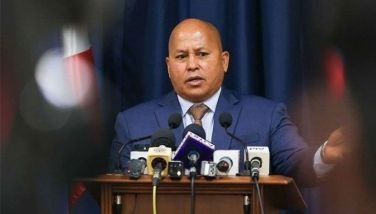Our students are non-readers
When they announced that the country will be participating in 2022 Program for International Student Assessment (PISA) late last month, top officials of the Department of Education (DepEd) led by Secretary Leonor Briones sanguinely expressed the intent to improve our performance even as they discussed stop gap measures intended to make that happen. They dwelt upon the need of enhancing reading literacy performance but as usual, they made it look like the problem was only in the aspect of comprehension and does not include students who could not read at all. Yes, there was no mention of the grim and impossible odds surrounding our future participations in the PISA such as the following:
First, the educational foundation of the students who took the 2018 PISA was laid by the old curriculum which is unquestionably superior to the K-12 curriculum when it comes to the development of proficiency in English, the test language. Consider the drastic reduction of the role of English in the first three grades on account of the adoption of the Mother Tongue policy as follows: time allotment per day reduced from 100 minutes to 43.33 minutes; beginning reading in English offered starting in second semester of Grade 2 while before, children were reading in English in Grade 1; English becomes medium of instruction only in Grade 4 instead of in Grade 1 as the medium of instruction from Grades 1 to 3 is the Mother Tongue.
Second, there never was a time in recent memory that we had more non-readers and frustration level reader in high school than we have now. Exposed by the media in early 2018, it had since become public knowledge that even our high schools are invaded by non-readers and struggling readers. The situation which the DepEd still determinedly wants to deny and hide has been confirmed by no less than the United Nations Children’s Fund (UNICEF) when it reported that in the 2019 Southeast Asian Primary Learning Metrics (SEA-PLM) assessment it conducted jointly with the Southeast Asia Ministers of Education Organization (SEAMEO), it was found that 27 percent of our Grade 5 pupils could not read based on the SEA-PLM definition of reading literacy.
Thus the reading crisis all but dooms our chance of performing better in the PISA because students who could not read or could hardly read expectedly bring up the rear in examinations. That is unless between now and the enrolment this June, our DepEd officials will come to their senses and belatedly heed the suggestion of the Philippine Institute for Development Studies back in early 2019 for schools to stop sending non-readers to high school which they have ignored until now and clear up the secondary from illiterates, ensuring that this time around, we will not be sending any to the PISA. That would mean a lot for our chances of budging from the cellar because for one, in 2018 we were edged out by Dominican Republic by only two points in reading literacy. – Estanislao C. Albano, Jr. casigayan@yahoo.com
- Latest























